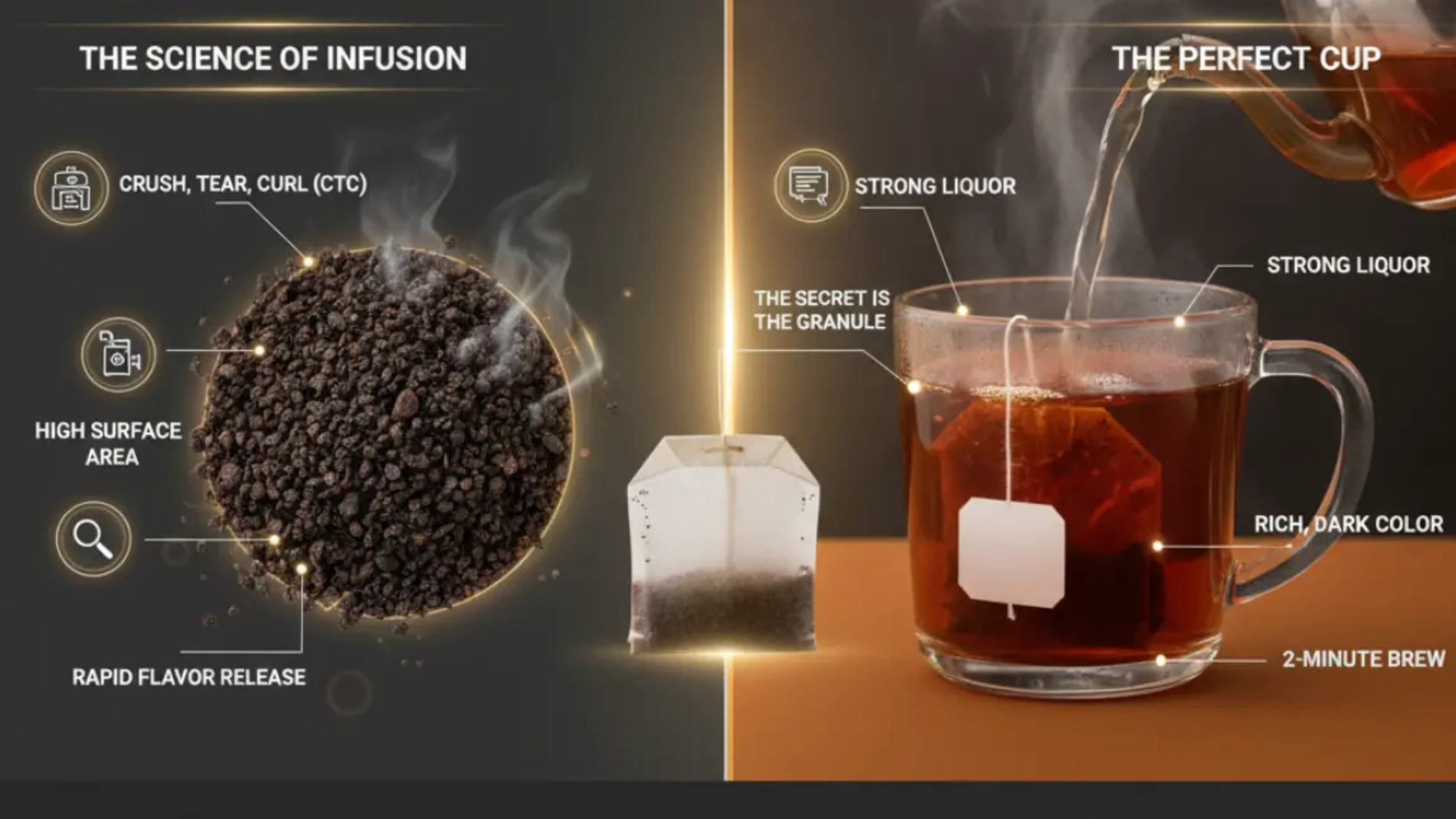The humble tea bag is a marvel of modern convenience. Billions are used daily across the globe, each one carrying a simple promise: a fast, satisfying, and consistent cup of tea. For the global tea bag companies and manufacturers who produce these items by the million, meeting this promise is a complex logistical and technical challenge.
To succeed, they cannot use just any tea. They rely almost exclusively on one specific type of product: Indian CTC Black Tea Powder.
While the world of artisanal tea is dominated by whole-leaf “orthodox” teas, the mass-market tea bag industry is built on the robust, efficient, and powerful foundation of CTC. As a leading finest black tea powder supplier based in India, we understand why this isn’t just a preference—it’s an engineering necessity. Here’s a deep dive into why CTC tea is the undisputed king of the tea bag.
1. The Need for Speed: Rapid and Powerful Infusion
The modern tea drinker is not patient. A tea bag is expected to deliver a rich, dark cup of tea in 2-3 minutes, not the 5-7 minutes required for a loose-leaf pot. This is where CTC’s primary function shines.
CTC stands for Crush, Tear, Curl, a highly mechanized production method where fresh tea leaves are passed through a series of rollers that macerate and form them into small, hard, dense granules. These tiny pellets have an incredibly high surface-area-to-volume ratio.
When they hit hot water, they release their flavour, colour, and compounds almost instantly. This quick infusion process floods the water with a strong liquor and deep color, satisfying the consumer’s need for a fast and effective brew. A whole-leaf orthodox tea, by contrast, needs time to unfurl and slowly release its essence, making it completely unsuitable for a standard tea bag.
2. Consistency is King: The Power of Mechanization
A global tea brand must ensure that its English Breakfast tea tastes the same in London, New York, and Sydney. This level of consistency is impossible to achieve with artisanal, hand-processed teas. The Indian CTC Black Tea Powder process is a marvel of industrial precision.
The mechanized system of crushing, tearing, and curling ensures a 100% uniform product. The particle size, density, and oxidation level are meticulously controlled, batch after batch. This means that every single tea bag in a production run of millions will brew a cup of tea with the exact same strength, colour, and taste profile. For a brand’s reputation, this consistency is non-negotiable.
Spice Up Your Business with Authentic Indian Flavors
Import and Export Excellence from India!

3. A Perfect Fit: Why CTC Grades (Fannings & Dust) are Ideal
Tea bag manufacturing is a precise science. The bags are small and made of porous paper, and they need to be filled quickly by high-speed machinery. The output of the CTC process is not one single powder, but a range of tea grades sorted by particle size.
The two smallest grades are the lifeblood of the tea bag industry:
Fannings (OF – Orange Fannings): Small particles that are larger than Dust. They form the base of many blends, providing a great balance of brisk flavour and rich colour.
Dust (D/PD – Dust/Pekoe Dust): The finest particles. Dust infuses extremely quickly to produce the strongest, darkest liquor. It is a vital component for blends that need a powerful colour kick.
These grades are small enough to fit perfectly into a tea bag and infuse rapidly, but large enough that they don’t seep through the paper’s pores like a fine flour would. This allows blenders to create a precise “recipe” (e.g., 70% Fannings, 30% Dust) to craft their signature, replicable brew.
4. A Flavor Foundation Built for Milk and Sugar
The vast majority of black tea bags sold globally are not consumed black. They are taken with milk, sugar, or both. This requires a tea with a flavour profile that is strong enough to “cut through” the creaminess and sweetness without becoming weak or watery.
This is the superpower of Assam CTC tea. The Camellia sinensis assamica variety, grown in the Brahmaputra Valley, is famed for its bold, brisk, and malty flavour. This inherent strength is a feature, not a bug. A delicate, floral Darjeeling would be completely lost in a mug of milk. The robust character of Indian CTC Black Tea Powder is specifically prized because it provides the powerful, satisfying foundation that a breakfast tea requires.
5. The B2B Advantage: Supply Chain and Cost-Effectiveness
Finally, the realities of mass-market production demand an ingredient that is both cost-effective and available in massive quantities. India is the largest producer of CTC tea in the world.
Scale: Sourcing bulk black tea from an Indian tea supplier guarantees a stable, high-volume supply chain that can meet the colossal demands of multinational corporations.
Cost: The CTC process is highly efficient, fast, and high-yield. This efficiency makes it a more affordable and commercially viable raw material than the labor-intensive, time-consuming process of creating orthodox whole-leaf teas.
For tea bag companies, Indian CTC Black Tea Powder isn’t just one option among many. It is the perfect, engineered solution that meets their precise needs for speed, strength, consistency, and scale.
Spice Up Your Business with Authentic Indian Flavors
Import and Export Excellence from India!

Frequently Asked Questions (FAQs)
1. What do the CTC tea grades like BOP, OF, and PD mean?
These are size classifications. BOP (Broken Orange Pekoe) is a larger granule, often sold as a “strong” loose-leaf tea. OF (Orange Fannings) and PD (Pekoe Dust) are the smaller grades, which are ideal for tea bags due to their quick infusion.
2. Is CTC tea lower quality than whole-leaf (orthodox) tea?
It’s not lower quality; it’s different. It is engineered for a different purpose. Orthodox tea is prized for its subtle, complex, and delicate flavors (like wine). CTC tea is prized for its bold, strong, and consistent flavor, designed to stand up to milk and sugar.
3. Can you use orthodox (whole-leaf) tea in tea bags?
While some premium “pyramid” tea bags do use whole leaves, they are much more expensive and require a longer steeping time (4-5+ minutes). They are not suitable for the standard 2-minute brew that the mass market demands.
4. Why is Assam, India so famous for CTC tea?
The Assam region of India is the birthplace of the Camellia sinensis assamica tea plant, which has a naturally bold, robust, and malty flavour. This strong character is the perfect raw material for the CTC process, creating a final product that is renowned for its strength.
5. How is CTC black tea powder different from “instant tea”?
CTC Black Tea Powder (Fannings/Dust) consists of tiny, dried granules of the actual tea leaf that must be infused in hot water. “Instant tea” is a dehydrated crystal of already-brewed tea that dissolves completely in water (like instant coffee).
6. Does CTC tea have fewer health benefits?
No. CTC tea is still packed with the same antioxidants (flavonoids) and caffeine as orthodox tea. The primary difference is the flavor profile and infusion speed, not the core health benefits.
7. What is the best grade of CTC tea for a very strong “builder’s tea”?
A blend with a high percentage of Dust (PD) grade will produce the strongest, darkest, and quickest brew, which is often sought after for a classic “builder’s tea” or a strong breakfast blend.
8. How do I choose a good Indian tea supplier for my business?
Look for an experienced Indian tea supplier who understands the different tea grades and can provide a detailed Certificate of Analysis (COA) for each batch. They should be able to provide consistent blends that match your precise specifications for flavor, strength, and particle size.
About us
We bridge the gap between local producers and global markets, ensuring seamless trade facilitation with exceptional quality and reliability. We provide quick delivery services with customized packaging with all approval of International Certificates (Spices board India, MSME, IEC, fssai, FIEO, APEDA, EU certification, FDA and Many More)
Contact us
Shop No. 3, Ganesh Prestige Sr. No. 2/15, Near Laxmi Jewellers, Dhanakawadi, Pune – 411043, Maharashtra INDIA.
Call On
+91 9545205050
+91 9822422584



Leave A Comment